20 Low-Sugar Fruits For A Healthier Body

This post may contain affiliate links. If you make a purchase through links on our site, we may earn a commission.
While fruits are known for their natural sweetness, not all varieties are created equal when it comes to sugar content.
Whether you're watching your sugar intake or simply looking to make healthier choices, incorporating fruits with low sugar into your diet can be a game-changer.
From tangy berries to refreshing melons, this article explores a variety of fruits:
1. Strawberries
Strawberries stand out as fruits with the least sugar, making them a guilt-free delight. Their taste is a harmonious blend of sweetness and tartness, while their texture offers a satisfying crunch followed by a burst of juiciness.
In addition to their delectable flavor, strawberries benefits pack a nutritional punch, boasting high levels of vitamin C, fiber, and antioxidants.
These nutrient powerhouses contribute to various health benefits, including improved heart health, better digestion, and enhanced immune function, making strawberries an excellent choice for both taste and wellness.
2. Peaches
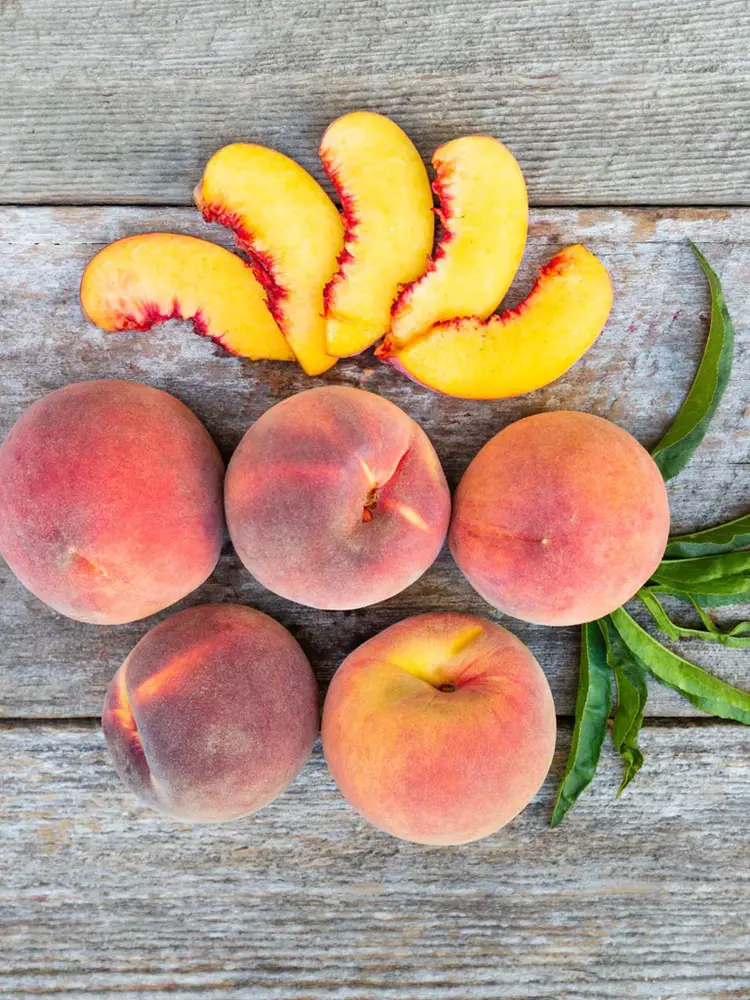
Peaches are a delicious fruit known for their low sugar content. They have a round shape with fuzzy skin that ranges in color from yellow to orange. When ripe, peaches have a juicy and sweet-tart taste.
Their texture is soft and velvety, making them enjoyable to eat. Aside from their pleasant flavor, peaches also offer numerous health benefits.
They are packed with essential vitamins such as vitamins C, A, and E, as well as dietary fiber. Peaches are also a good source of antioxidants, which help protect the body against harmful free radicals and promote overall well-being.
3. Blackberries
Blackberries, with their deep purple hue and delicate, juicy appearance, are a delightful option among fruits with the least sugar.
Their flavor is a perfect balance of sweetness and tartness, while their texture offers a satisfying burst of juiciness with each bite. These berries are not only delicious but also pack a nutritional punch, being rich in fiber, vitamins C and K, and antioxidants.
4. Lemons

Lemons, with their vibrant yellow hue and smooth, glossy skin, are renowned for their tangy flavor and invigorating aroma. Despite their sour taste, lemons are surprisingly low in sugar, making them an ideal choice among fruits that are low in sugar.
Their juicy flesh boasts a refreshing tartness, while their pulp adds a zesty kick to various dishes and beverages. Packed with vitamin C, antioxidants, and minerals like potassium, lemons offer a plethora of health benefits, including immune support, hydration, and improved digestion.
5. Honeydew Melon
Honeydew melon, often hailed as one of the lowest fruits in sugar, entices with its pale green, smooth exterior, and juicy, sweet flesh. Its subtly sweet taste offers a refreshing burst with every bite, while its texture is crisp and succulent.
Beyond its delightful flavor, honeydew melon boasts a wealth of health benefits. Rich in vitamins C and K and potassium, this fruit supports immune function, bone health, and hydration.
With its low sugar content and nutrient-rich profile, honeydew melon is a guilt-free indulgence for those seeking a sweet yet nutritious snack.
6. Oranges
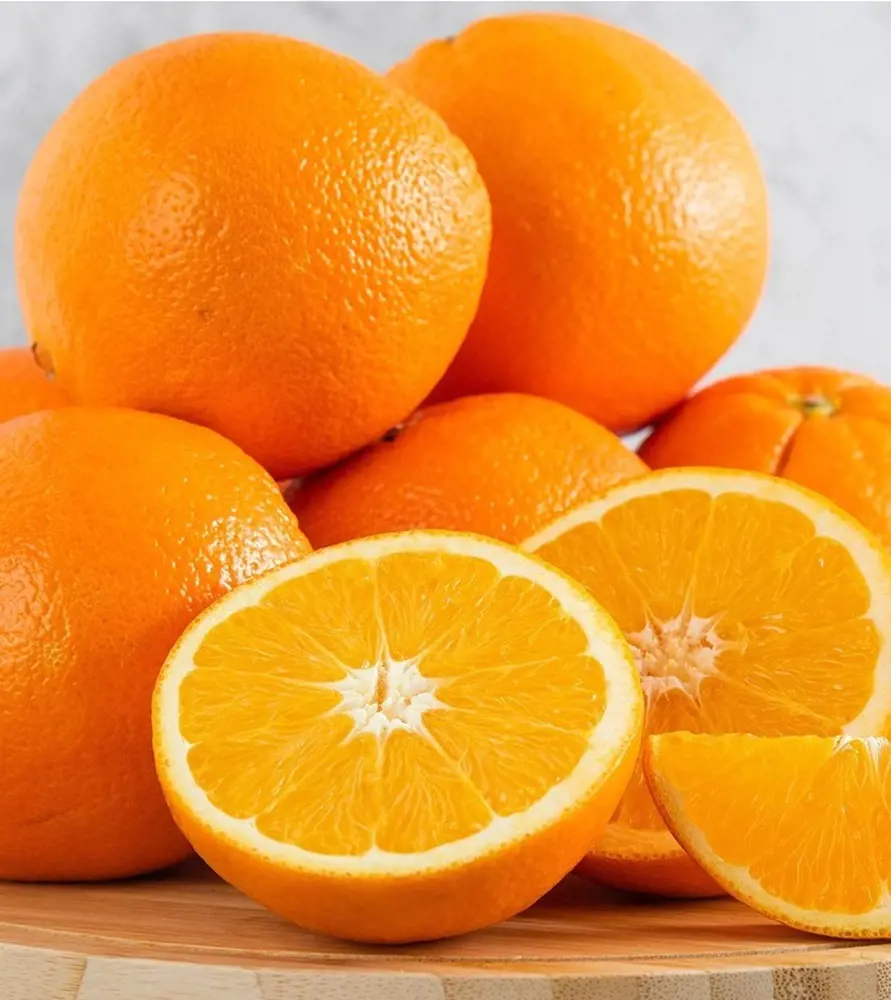
Oranges are a citrus fruit known for their vibrant orange color and round shape. They have a tangy, sweet taste with a hint of acidity and a juicy, pulpy texture. Despite their sweet flavor, oranges are relatively low in sugar compared to other fruits.
They are packed with various nutrients, including vitamin C, which boosts the immune system and promotes collagen production.
Oranges also provide potassium, dietary fiber, and antioxidants, which support heart health and reduce the risk of chronic diseases. Additionally, their low-calorie content makes them an excellent choice for weight management.
7. Grapefruit
Grapefruit is a citrus fruit known for its round shape with a yellow or pinkish hue and low sugar content. The taste of grapefruit can vary from sweet to tangy, and its texture is juicy and slightly acidic. This fruit is a great source of vitamins C and A, as well as dietary fiber.
It is also rich in antioxidants and contains minerals like potassium and magnesium. Grapefruit has numerous health benefits, including boosting the immune system, aiding digestion, and promoting heart health. Its low sugar content makes it an ideal choice for individuals looking to manage their sugar intake.
8. Avocados
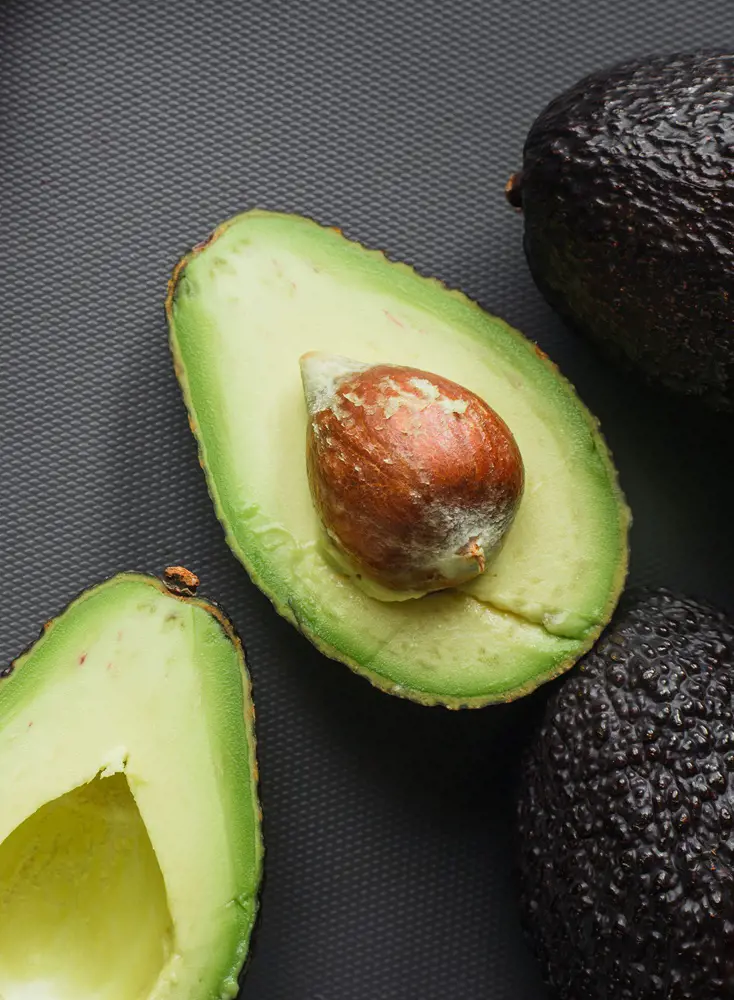
Avocados have a distinctive appearance, characterized by dark green, rough skin, and smooth, creamy flesh inside. They are a unique fruit with low sugar content, making them a popular choice for health-conscious individuals.
The taste of avocados is often described as buttery and nutty, while their texture is rich and creamy. Apart from their deliciousness, avocados are packed with health benefits.
They are an excellent source of healthy fats, fiber, and various essential nutrients like vitamins C, E, K, and B6, as well as minerals like potassium and folate. Additionally, avocados promote heart health, aid in digestion, and support weight management.
9. Cranberries
Cranberries are small, round fruits that are native to North America. They have a distinctive deep red color and a tart flavor. Cranberries have a firm and slightly crunchy texture.
One of the key advantages of cranberries is their low sugar content, making them a great option for those watching their sugar intake.
They are also packed with health benefits, as they are rich in antioxidants, vitamin C, fiber, and various phytonutrients. These nutrients contribute to improved urinary tract health, reduced risk of certain cancers, improved digestion, and enhanced immune function.
10. Watermelon
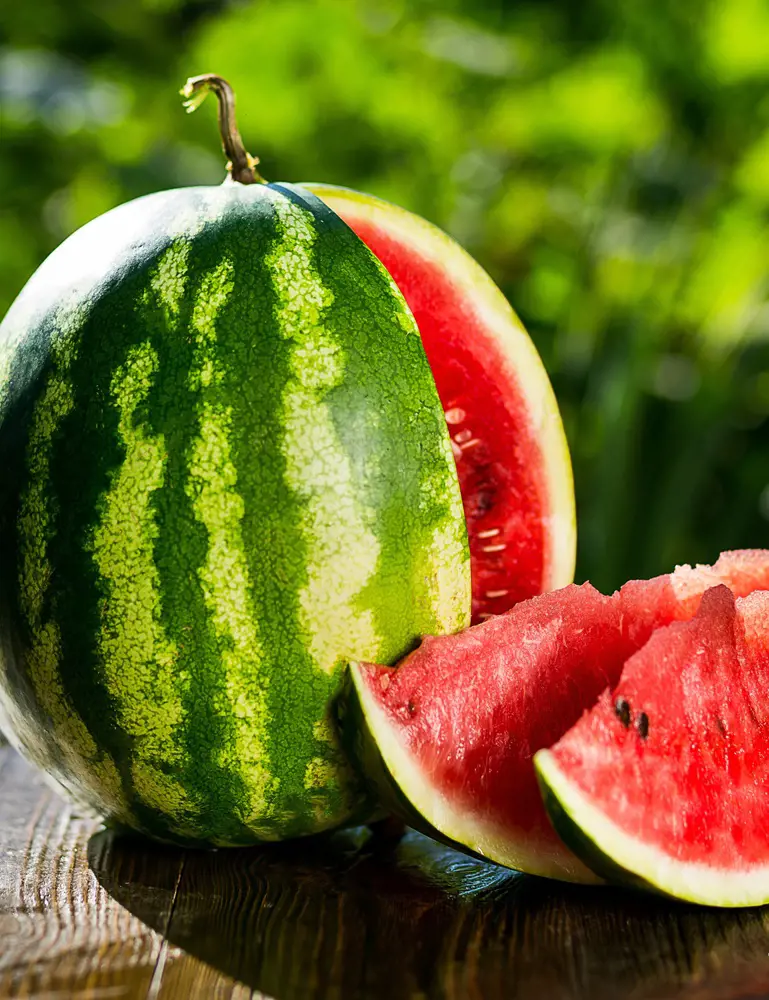
Watermelon, despite its reputation for sweetness, surprises many as a fruit with relatively low sugar content. Its appearance is iconic, with vibrant red flesh contrasted by green rind, enticingly juicy and refreshing.
The taste is subtly sweet with a hint of crispness, complementing its hydrating texture. Beyond its deliciousness, watermelon packs a nutritional punch, boasting high levels of vitamins A and C, along with antioxidants like lycopene, known for its potential health benefits in promoting heart health and reducing inflammation.
11. Kiwis
Kiwis are small, oval-shaped fruits with fuzzy brown skin and vibrant green flesh. They have a tangy and sweet flavor with a hint of tartness.
Kiwis are known for their low sugar content, making them an ideal choice for those watching their sugar intake. They are also rich in essential nutrients, including vitamin C, vitamin K, vitamin E, potassium, and fiber.
These nutrients contribute to various health benefits such as boosting the immune system, aiding digestion, promoting heart health, and supporting healthy skin. The fruit has a refreshing and slightly acidic taste and a soft, juicy texture.
12. Apricots
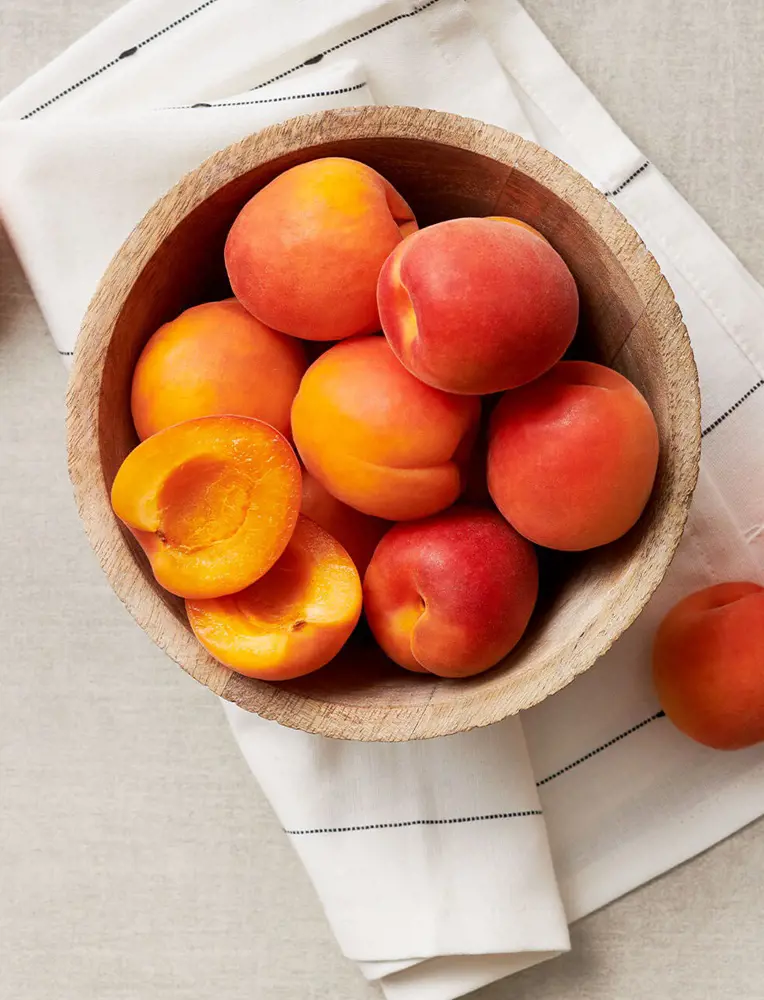
Apricots are a delightful fruit known for their sweet yet tangy flavor and velvety texture. Despite their sweetness, they are relatively low in sugar compared to many other fruits.
Their appearance is characterized by a small, round shape with velvety, golden-orange skin. Apricots are rich in essential nutrients like vitamin A, vitamin C, and fiber, promoting healthy skin, immunity, and digestion. With their low sugar content and an array of health benefits, apricots make for a nutritious addition to any diet.
13. Plums
Plums are a fruit known for their vibrant appearance, typically showcasing hues ranging from deep purple to reddish-orange. Their taste is a delightful blend of sweetness with a hint of tartness, offering a refreshing burst of flavor.
The texture of plums is juicy and succulent, with smooth skin encasing the soft flesh inside. Beyond their delicious taste, plums boast an impressive array of health benefits, including being rich in vitamins, minerals, and antioxidants.
Incorporating plums into your diet can promote digestive health, support immune function, and contribute to overall well-being.
14. Papaya
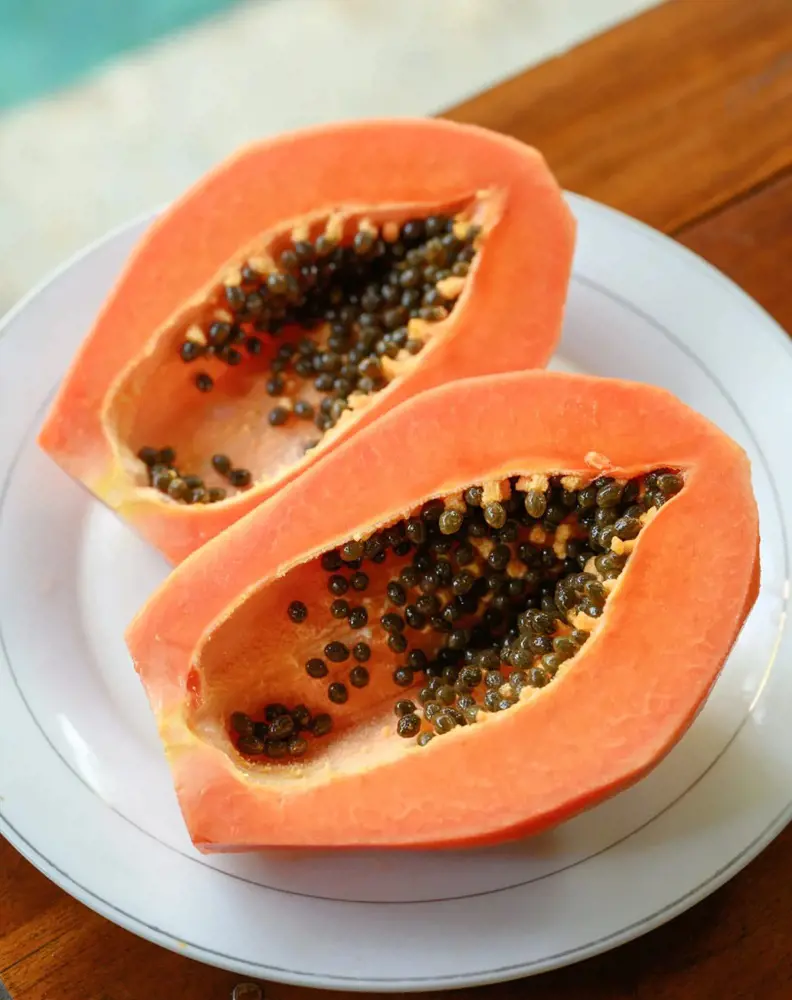
Papaya is a tropical fruit known for its vibrant orange flesh and pear-like shape. Despite its sweet taste, it's surprisingly low in sugar compared to other fruits.
Its flavor is a delightful mix of sweetness and subtle tanginess, while its texture is soft and creamy, akin to a ripe mango.
Rich in vitamins C and A, as well as folate and potassium, papaya offers numerous health benefits, including improved digestion, boosted immunity, and potential anti-inflammatory properties, making it a nutritious addition to any diet.
15. Cantaloupe
Cantaloupe is a refreshing fruit and a great option for people trying to regulate their sugar intake. It has a distinctive appearance with a round shape, ribbed skin, and vibrant orange flesh.
The taste of cantaloupe is sweet and slightly musky, while its texture is juicy and firm. This fruit is packed with health benefits, as it is a great source of vitamins A and C, as well as potassium and fiber.
Its low sugar content makes it an ideal choice for individuals looking to reduce their sugar intake while still enjoying delicious and nutritious fruit.
16. Guavas
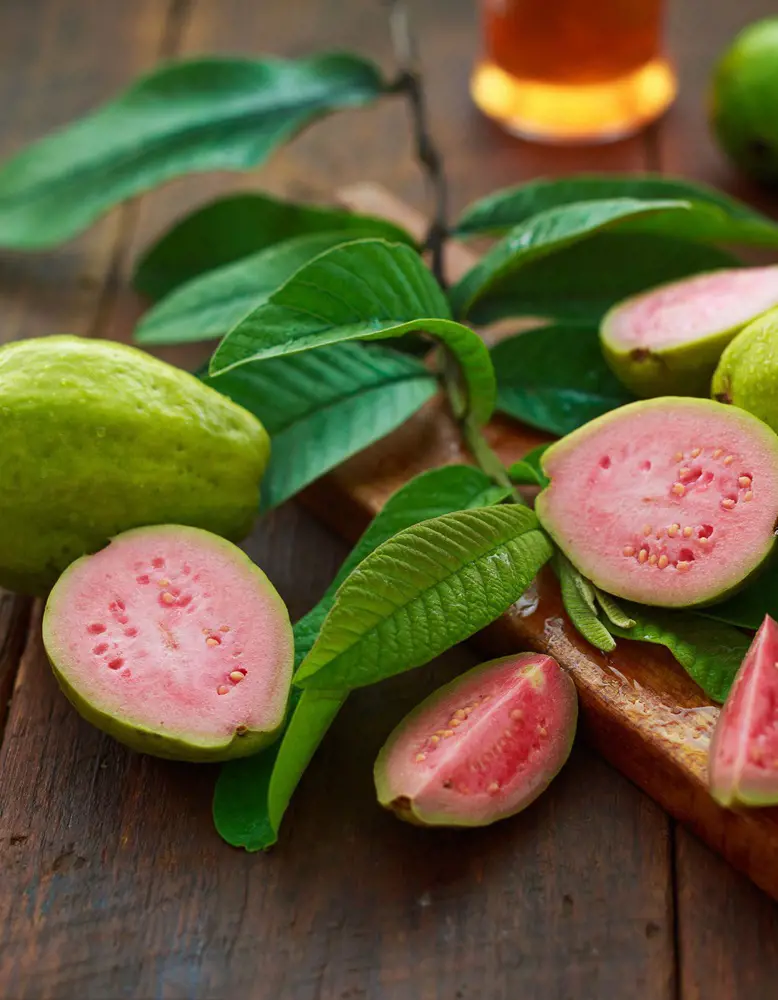
Guavas, with their distinctive green or yellow skin and pink flesh, are not only visually appealing but also boast a surprisingly low sugar content among fruits.
Their flavor is a delightful mix of sweet and tangy, while their texture ranges from crunchy to creamy, depending on ripeness.
Packed with vitamin C, fiber, and antioxidants, guavas offer a myriad of health benefits, including immune support, digestive health, and skin rejuvenation. Incorporating guavas into your diet provides a delicious way to enjoy a nutrient-rich fruit without excessive sugar intake.
17. Raspberries
Raspberries emerge as a delightful fruit option for those monitoring their sugar intake. These vibrant berries boast a deep red color, with a delicate, slightly tart taste and a juicy, yet firm texture.
In addition to their refreshing flavor, raspberries pack a nutritional punch, being rich in fiber, antioxidants like vitamin C and flavonoids, and various minerals.
Their low sugar content and high fiber content make them an excellent option for promoting digestive health, managing blood sugar levels, and supporting overall well-being.
18. Dragon Fruits
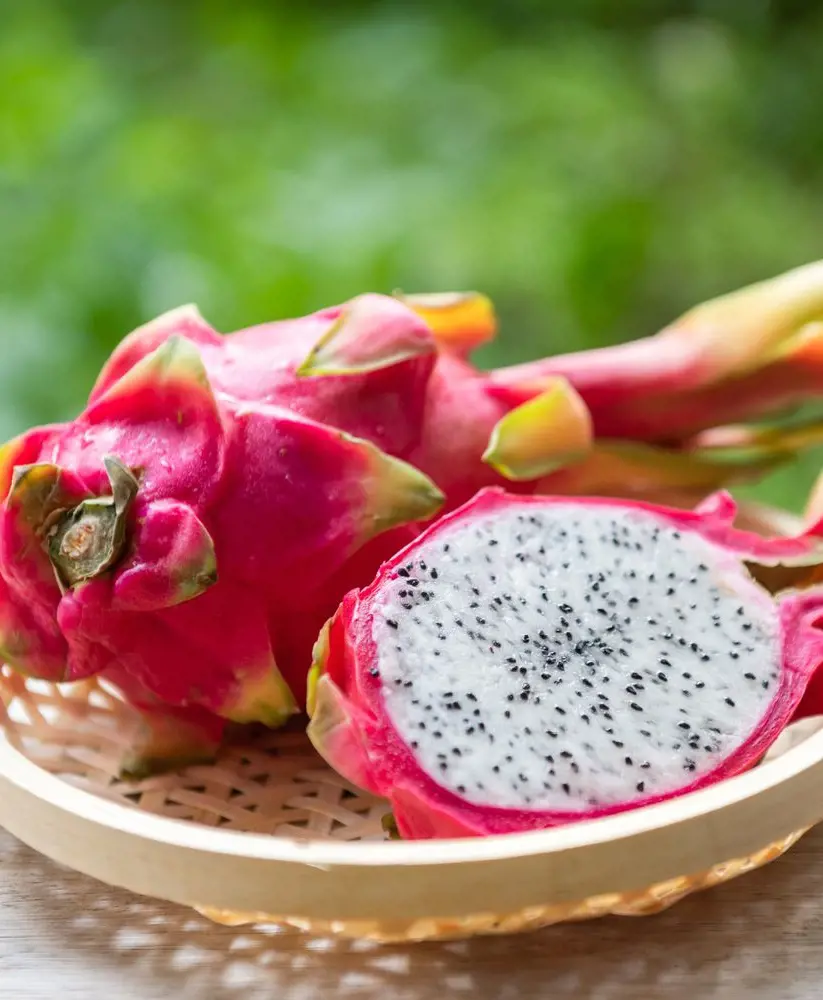
Dragon fruit, also known as pitaya, is a fruit with a low sugar content. It has a unique appearance, with vibrant pink or yellow skin covered in scales. When cut open, the fruit reveals a white or pinkish flesh filled with small black seeds.
Dragon fruit has a mildly sweet taste, similar to a blend of kiwi and pear, and a crunchy texture. Besides being low in sugar, it is also low in calories and high in fiber, making it a great choice for those watching their sugar intake.
Additionally, dragon fruit benefits include its rich content of antioxidants, vitamin C, and several essential minerals, promoting a healthy immune system and aiding digestion.
19. Figs
Figs are a delectable fruit renowned for their unique appearance, taste, and texture. These small, pear-shaped fruits possess a smooth, purple or greenish skin, concealing a soft, sweet flesh that is succulent and slightly chewy.
Rich in dietary fiber, figs aid in digestion and promote a healthy gut. Additionally, they provide essential minerals such as potassium, calcium, and magnesium, which contribute to bone strength and muscular function.
Figs benefits include vitamins A and K, supporting healthy vision and blood clotting. With their low sugar content, figs are a satisfying and nutritious option for those seeking a naturally sweet treat.
20. Tomatoes

Tomatoes are botanically classified as a fruit due to their seed-bearing structure. They have a relatively low sugar content compared to other fruits.
The taste of tomatoes can vary from mildly sweet to slightly tangy, and their texture can be juicy and pulpy. These fruits are rich in vitamins A, C, and K, as well as antioxidants like lycopene, which has been associated with various health benefits including reduced risk of heart disease and certain cancers.
Recent posts
Nutrition
Nutrition
Liquorice Root: Benefits And Uses
You can spell it liquorice or licorice; this herb or root has been in use for centuries in most medicinal applications, as a natural sweetener and to enhance flavors. Regarding its origins, it comes from the root of the "Glycyrrhiza galbre" plant and...
Nutrition
Is Ramen Healthy? Here's What Dietician Says
Ramen is a traditional dish from Japan that in the recent era has become a global phenomenon. This beloved and comforting soupy dish however has been questioned, when it comes to its nutrition. Best for those looking for a quick (instant), affo...
Nutrition
Is Wheat Bread Healthy? An Expert Picks
Wheat bread has been proudly celebrated as a dietary staple in countless homes for as long as people can remember. It has earned a reputation as a healthier alternative to white or any other processed bread, that no one can deny. Because of its evide...
Nutrition
Is Sausages Healthy? Nutrition And Health Benefits
Sausages are tasty in an addictive way, making them one of the most popular foods worldwide. You may have enjoyed this convenient food often, whether on a bun with mustard or grilled on a barbecue, the simple preparation methods are what makes its co...
Nutrition
Ice Cream Benefits: Nutrition, Potential Risks And Best Choices
Not gonna lie, ice cream is often taken as a guilty pleasure treat, a delightful treat that takes you to cloud nine but is frequently associated with negative health implications. Nonetheless, the happy news is when devoured mindfully, ice cream can ...
Nutrition
Is Sushi Healthy? Some Good and Bad Choices
Sushi is a wholesome meal and a beloved Japanese dish. The traditional sushi recipe is a simple combination of fresh fish, vegetables, and vinegared rice which is popular for its minimalistic preparation. As with any food, there are factors that dete...







